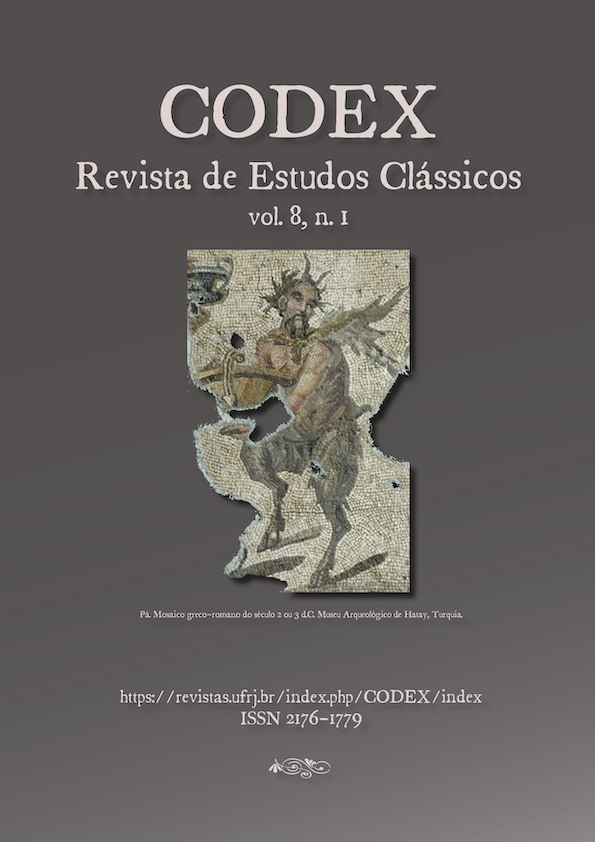The singularity of Agamemnon’s characterization in Seneca’s "Troades"
DOI:
https://doi.org/10.25187/codex.v8i1.33931Keywords:
Seneca, Latin tragedy, Troades, Agamemnon, characterizationAbstract
Present in several epic and dramatic works, Agamemnon also features in Seneca’s tragedy Troades. Even though essential for the action development, Agamemnon’s presence in that text occurs rather briefly, comprising only one dialog he holds with Pyrrhus, the son of Achilles, in the first episode (Tro. 249-352). In that dialog, the discourse provides the elements for Agamemnon’s characterization. The king of Mycenae introduces himself at first as a reasonable thinker and a mercifulmonarch, who reflects upon the philosophic nature of power and duty. As the tragedy unfolds, Agamemnon aware of his authority as a king, claims that he will not allow Polyxena’s sacrifice, requested by Pyrrhus. In light of his young interlocutor’s provocations, however, he adopts an aggressive and vulgar tone. Yet, without arguments, he renounces his previous decision of sparing Polyxena’s life; instead, he submits it to the divine will. Compared with the sources and with other depictions of kingscreated by the author in his works, Agamemnon in Troades can be considered a character of great originality due to his multiple features.
References
ARISTÓTELES. Poética. Trad. de Eudoro de Souza. São Paulo: Ars poetica, 1992.
CAMPOS, Haroldo. Ilíada de Homero. Vol. I. Introdução e organização de T. Vieira. São Paulo: Editora Mandarim, 2002.
CARDOSO, Z. A. Estudos sobre as tragédias de Sêneca. São Paulo: Alameda, 2005.
ÉSQUILO. Oresteia I. Agamêmnon. Estudo e tradução. Jaa Torrano. São Paulo: Fapesp / Iluminuras, 2004.
EURIPIDE. Iphigénie à Aulis. Texte établi et traduit par François Jouan. Paris, Les Belles Lettres, 1983.
EURÍPIDES. Teatro Completo. Tradução de Jaa Torrano. São Paulo: Ed. Iluminuras, vol 1: 2015; vol 2: 2016; vol 3: 2018.
EURÍPIDES. Duas tragédias gregas. Hécuba e Troianas. Tradução e introdução. Christian Werner. São Paulo: Martins Fontes, 2004.
FITCH, John G. (Edit.). Seneca. Oxford: Oxford University Press, 2008.
GRIMAL, P. Dictionnaire de la Mythologie Grecque et Romaine. Paris: Presses Universitaires de France, 1951.
HOMÈRE. L’Odyssée. Traduction nouvelle avec introduction, notes et index par M. Dufour et J. Raison. Paris: Garnier, 1947.
SÊNECA/ SALÚSTIO. Tratado sobre a clemência. Introdução, tradução e notas de I. Braren/ A conjuração de Catilina. A guerra de Jugurta. Introdução e tradução de A. S. Mendonça. Petrópolis, RJ: Vozes. 1990.
SÊNECA, L. A. Tragédias. A loucura de Hércules. As troianas. As fenícias. Tradução, introdução, apresentações e notas de Z. A. Cardoso. São Paulo: WMF Martins Fontes, 2014.
SÉNÈQUE. Tragédies. Texte établi et traduit par L. Herrmann. Paris, Les Belles Lettres, 1971 (Vol. I).
STROH, Wilfried. “Staging Seneca: the Production of Troas as a Philological Experiment”, in FITCH, John G. (Edit.). Seneca. Oxford: Oxford University Press, 2008. p. 195-220.
TEMMERMAN, K.; BOAS, E. E. Characterization in Ancient Greek Narrative. (Mnemosyne Supplements Vol. 411). Leiden/Boston: Brill, 2017.
Downloads
Published
How to Cite
Issue
Section
License
This work is licensed under a Creative Commons Attribution-NonCommercial 4.0 International License.










